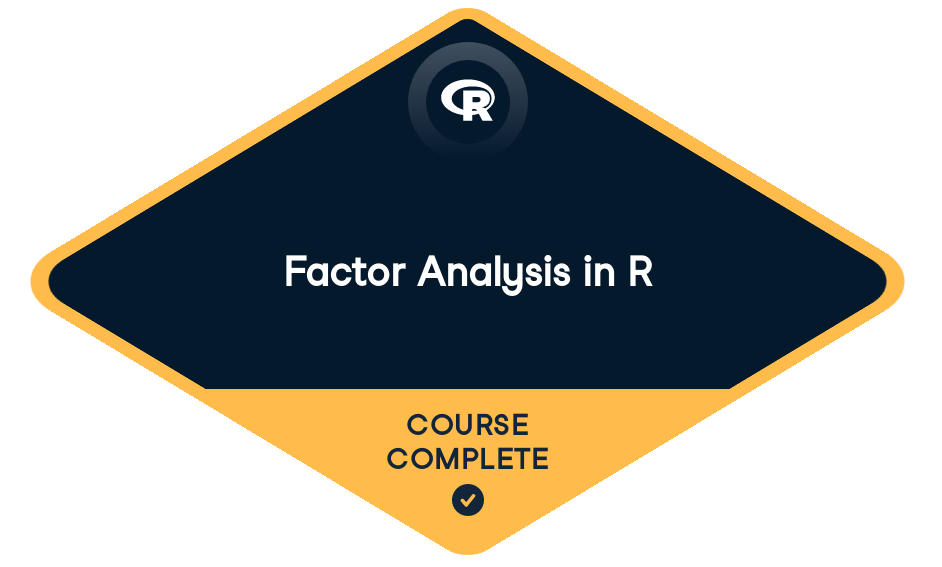
Loved by learners at thousands of companies
Course Description
Discover Factor Analysis in R
The world is full of unobservable variables that can't be directly measured. You might be interested in a construct such as math ability, personality traits, or workplace climate. When investigating constructs like these, it's critically important to have a model that matches your theories and data.This course will help you understand dimensionality and show you how to conduct exploratory and confirmatory factor analyses.
Learn to Use Exploratory Factor Analysis and Confirmatory Factor Analysis
You’ll start by getting to grips with exploratory factor analysis (EFA), learning how to view and visualize factor loadings, interpret factor scores, and view and test correlations.Once you’re familiar with single-factor EFA, you’ll move on to multidimensional data, looking at calculating eigenvalues, creating screen plots, and more. Next, you’ll discover confirmatory factor analysis (CFAs), learning how to create syntax from EFA results and theory.
The final chapter looks at EFAs vs CFAs, giving examples of both. You’ll also learn how to improve your model and measure when using them.
Develop, Refine, and Share Your Measures
With these statistical techniques in your toolkit, you'll be able to develop, refine, and share your measures. These analyses are foundational for diverse fields, including psychology, education, political science, economics, and linguistics."
Training 2 or more people?
Get your team access to the full DataCamp platform, including all the features.- 1
Evaluating your measure with factor analysis
FreeIn Chapter 1, you will learn how to conduct an EFA to examine the statistical properties of a measure designed around one construct.
Introduction to Exploratory Factor Analysis (EFA)50 xpStarting out with a unidimensional EFA100 xpViewing and visualizing the factor loadings100 xpInterpreting individuals' factor scores100 xpOverview of the measure development process50 xpDescriptive statistics of your dataset100 xpSplitting your dataset100 xpComparing the halves of your dataset100 xpMeasure features: correlations and reliability50 xpViewing and testing correlations100 xpInternal reliability100 xpWhen to use EFA50 xp - 2
Multidimensional EFA
This chapter will show you how to extend the single-factor EFA you learned in Chapter 1 to multidimensional data.
Determining dimensionality50 xpSplitting the BFI dataset100 xpCalculating eigenvalues100 xpCreating a scree plot100 xpInterpreting the scree plot50 xpUnderstanding multidimensional data50 xpConducting a multidimensional EFA100 xpInterpreting the results100 xpInvestigating model fit50 xpInterpret absolute model fit statistics50 xpSelecting the best model100 xp - 3
Confirmatory Factor Analysis
This chapter will cover conducting CFAs with the sem package. Both theory-driven and EFA-driven CFA structures will be covered.
Setting up a CFA50 xpCreating CFA syntax from EFA results100 xpCreating CFA syntax from theory100 xpUnderstanding the sem() syntax50 xpComponents of sem() syntax50 xpRun a CFA and interpret loadings100 xpExamine item loadings50 xpInvestigating model fit50 xpAbsolute fit statistics100 xpRelative fit statistics100 xp - 4
Refining your measure and/or model
This chapter will reinforce the difference between EFAs and CFAs and offer suggestions for improving your model and/or measure.
EFA vs. CFA revisited50 xpDifferences in estimated factor loadings100 xpPlotting differences in persons' factor scores100 xpAdding loadings to improve fit50 xpAdd loadings to improve fit100 xpCompare original model to model with added loadings100 xpEvaluate added loadings with relative fit stats100 xpImproving fit by removing loadings50 xpRemove loadings to improve fit100 xpCompare original model to model with deleted loadings100 xpEvaluate deleted loadings with relative fit stats100 xpWrap-Up Video50 xp
Training 2 or more people?
Get your team access to the full DataCamp platform, including all the features.collaborators


Join over 18 million learners and start Factor Analysis in R today!
Create Your Free Account
or
By continuing, you accept our Terms of Use, our Privacy Policy and that your data is stored in the USA.